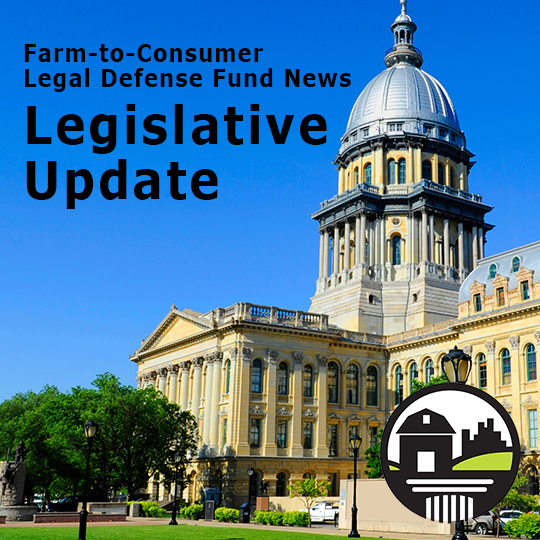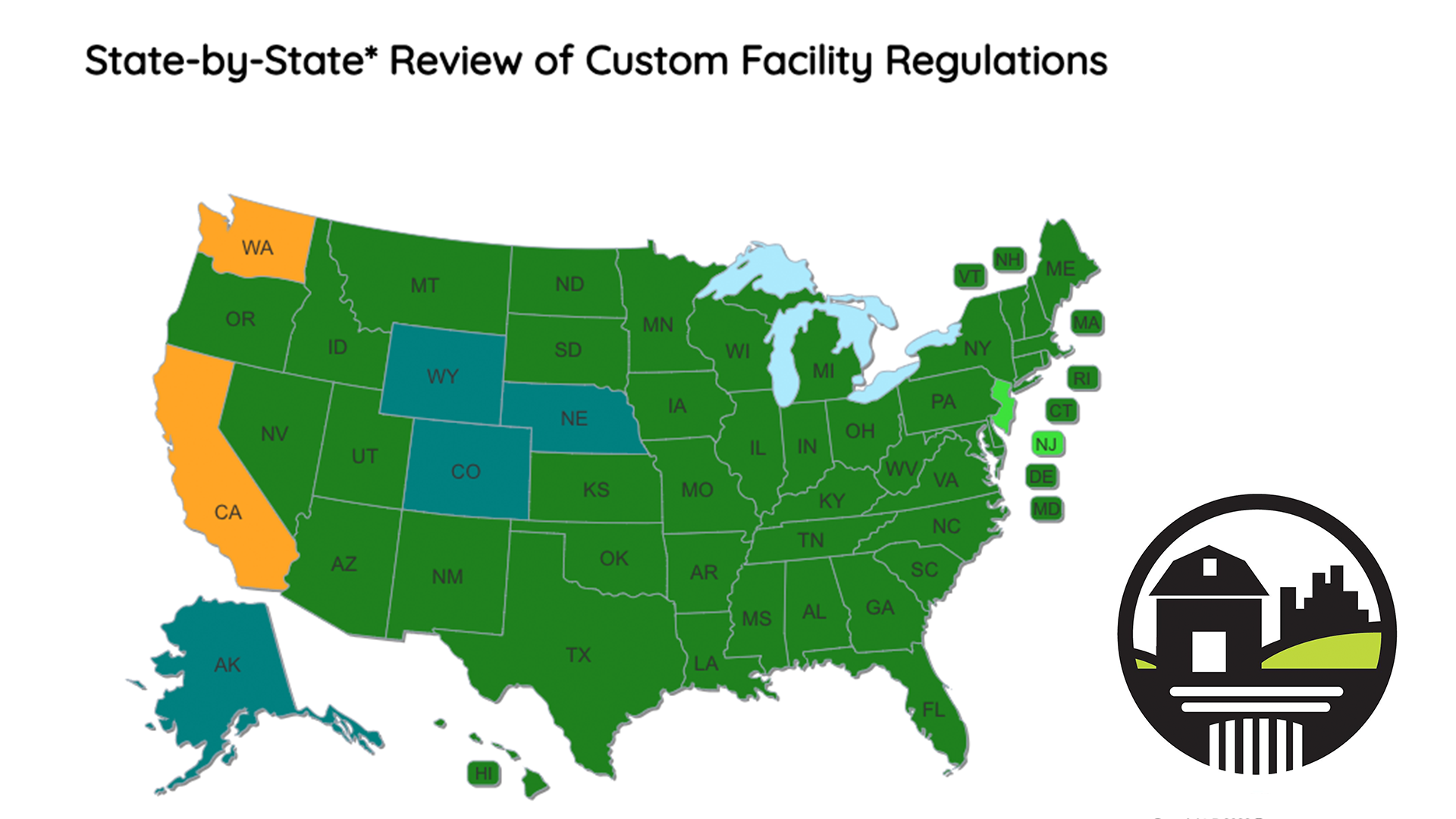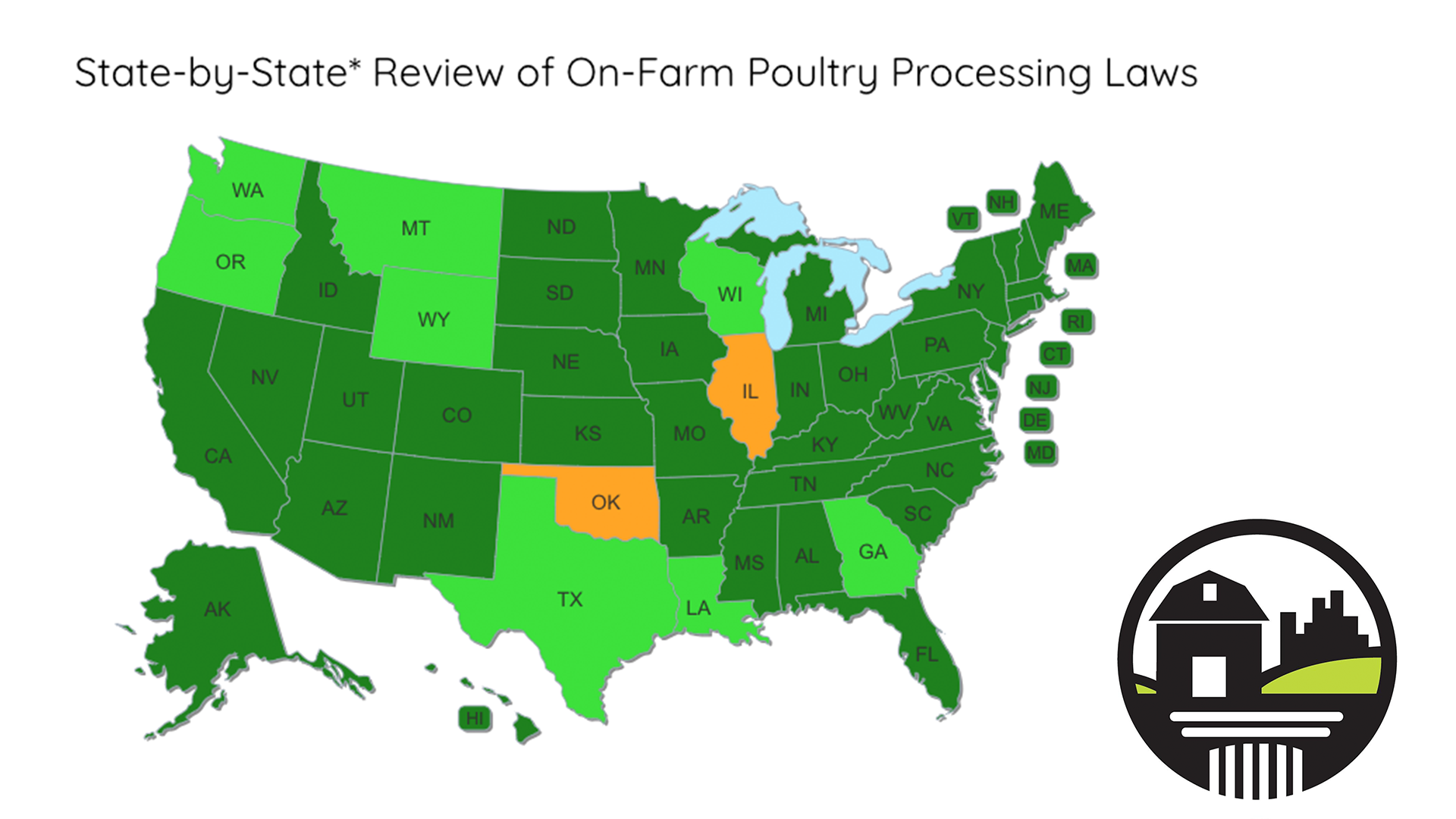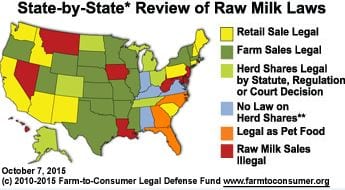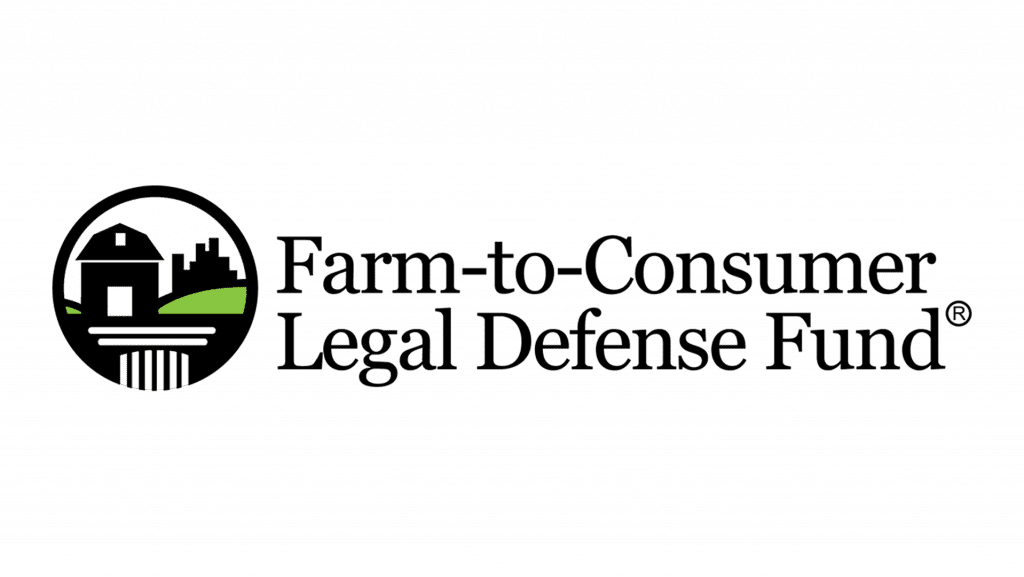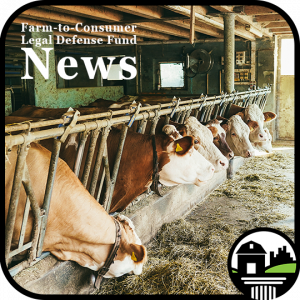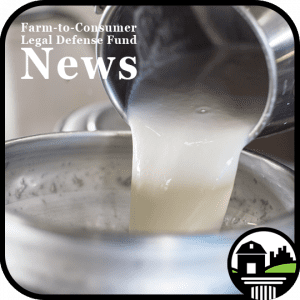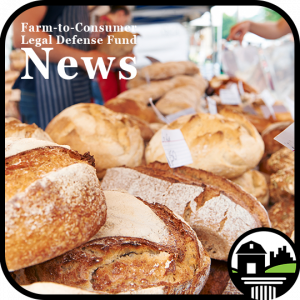Farm-to-Consumer Legal Defense Fund monitors, advises, and works to influence hundreds of food freedom bills and policies across the country that align with our mission.
We’ve been tracking their progress and engaging with legislators and our members to lend our support to those efforts that seek to expand food freedom. Join us for important policy news and legislative updates that affect independent farmers, ranchers, homesteaders, cottage food makers, and consumers.
While some state legislative sessions have closed, other remain open, even if only for several more weeks. Below is the progress to date of some of the most influential legislation and policies we are working to move forward.
If you wish to see the text of any bill below or read more about its progress through the legislature, visit our online Policy Tracker and follow the links provided.
Passed Into Law
Arkansas HB 1048 and SB 464
Amends the raw milk code to clarify that sales of raw goat, sheep, and cow milk are not limited to the farm and may be conducted at farmer’s markets or via delivery from the farm.
Arkansas HB 1279
Amends the AK Egg Marketing Act of 1969 to allow retailers to repackage eggs in their stores under certain conditions.
Arkansas HB 1594
Amends Arkansas tax law to create a new “farmer sales tax identification card” that will help farmers obtain tax exemptions more easily when purchasing goods for their agricultural businesses.
Connecticut HB 5064
Allows an option to Purchase Restricted Agricultural Lands at Agricultural Value: establishing a grant program to encourage and provide for the retention of agricultural lands for agricultural purposes.
Illinois HB 2196
Increases the number of birds allowed under the poultry exemption from 5,000 to 7,500 and opens sales to farmers markets, roadside stands, and deliveries. Requires a food protection certification, specific labelling and POS signage, and storage and packaging standards.
Kansas SB89
Authorizes the animal health commissioner to adopt rules and regulations to administer the poultry disease control act and to establish certain related participation, certification and testing fees.
Maine LD 124
Expands the Right to Food Act to protect vegetable gardens and to expand the principle of food sovereignty. Increases the number of foods that producers can sell direct to the consumer, the locations a producer can use to produce food products, and other food rights. Maine LD 124 also specifically clarifies that if permitted by local government, food producers may process or prepare food for sale in their home kitchens.
Maine LD 356
The introduced version of the bill sought to prohibit the use of any pesticide outdoors within 500 feet of a property owned by another person unless the person provides written notification to the owner/ occupant at least 7 days prior to application (did not apply to aerial application of pesticides). The revised bill prohibits a person from use of rodenticides in outdoor residential settings. Revised bill passed into law.
Minnesota HB 2446
This bill reduces the cottage food license fee from $50 to $30 and allows for cottage food products to be delivered by mail or other commercial services. The bill also changes the requirements for cottage food producers to complete food safety training courses every three years and requires the annual sales cap for cottage food producers to be adjusted every two years for inflation.
New Hampshire HB 150, 304, and 307
These bills update several cottage food definitions and requirements.
HB 150 updates the existing definition of “homestead food operation” in New Hampshire to allow the use of commercial kitchen equipment in home kitchens when preparing food for sale. Further, HB 304 expands both the labeling and licensing requirements for homestead food operations, so producers now have two labeling options: one with full ingredient details directly on the package, and another allowing a link to a website with information. The bill also removes previous restrictions on sales venues.
Last, HB 307 expands the definition of a “homestead food operation” to include both home kitchens and dedicated food production areas within one’s primary residence.
New Hampshire HB 505
Allows for homestead operations to sell freeze dried food.
North Dakota HB 1131
Allows for the sale of raw milk products to consumers in the state for personal consumption.
North Dakota SB 2386
Allows cottage foods to be shipped out of state to customers and sold over the internet, by phone, by mail, or by consignment.
North Dakota HB 1526
Amends North Dakota’s pet food registration requirements by expanding the definition of “labeling” to include promotional materials distributed through various media channels like radio, television, and internet platforms. The bill also modifies registration fees, establishing different rates for out-of-state ($100) and in-state ($50) manufactured pet food products.
Nevada AB 352
Increases the annual revenue cap for both cottage food and craft food operations to $100,000. The bill also allows cottage food operations to sell products over the phone, via the internet, through the mail, or with a food delivery service platform, but requires that the Nevada Department of Agriculture maintain a database for all licensed cottage food operations. Additionally, the bill creates additional record keeping requirements for craft food operations (producers of acidified foods) and now allows craft food producers to conduct transactions by telephone or internet but must fulfill the sale in person.
Oregon SB 809
Expands the state meat inspection program to allow the State Department of Agriculture to include poultry products alongside existing inspections as well as processing and sales regulations for meat from amenable species (like cattle and sheep). The changes require that any new inspection rules must be at least as stringent as federal standards in the Meat Inspection Act and the Poultry Products Inspection Act and that the department must have full federal approval. Additionally, the bill explicitly includes poultry in the list of meat products that can be donated under certain state-approved processing conditions. This law does not impact small poultry producers’ ability to continue to operate under the allowed poultry exemptions.
Tennessee SB 484 and HB 130
These bills define a homemade food item as an item that is produced by or under the direct supervision of the producer at the producer’s residence, and can be either a non-time/temperature control for safety food or a time/temperature control for safety food, as those are defined by the Dept of Agriculture. The bills allow producers to sell certain homemade food items to the extent permitted by federal law. Food items that do not contain meat, dairy or poultry can be sold by the producer or an agent of the producer in-person or remotely (including third party vendors such as a retail shop or grocery store) to the consumer. The sale of homemade food items that contain dairy, meat, or poultry, require that the producer sell directly (in-person or remotely) to and deliver to the consumer.
Texas SB 541
Expands the definition of cottage food operations to include non-profit organizations, allows the use of a “cottage food vendor” to sell on behalf of the producer, and increases the sales cap for cottage food operations to $150,000 annually.
Further, the bill also prevents localities from requiring a cottage food production operation to obtain any type of license or permit and expands the types of food cottage operations to allow for the sale of almost any kind of food made by TX producers in home kitchens directly to consumers in TX. This includes all kinds of temperature-sensitive foods, like cheesecakes, vegetarian casseroles, cut fruits and vegetables, frozen produce, and more. The only exceptions are meat, poultry, seafood, low-acid canned goods, THC/CBD products, raw milk products, and ices/frozen desserts.
The new law will also allow the sale of non-refrigerated homemade foods through third-party vendors for the first time, so products such as homemade baked goods, jams, pickles, dried spices and herbs, and more can be sold through local co-ops, niche grocers, and cafes.
Utah SB 315
Modifies regulations for microenterprise home kitchens, which are kitchens located in private homes where ready-to-eat food is prepared for sale to introduce more detailed requirements for food safety and handling, including provisions allowing operators to cook and serve time and temperature-controlled food within 72 hours if they maintain detailed temperature logs, prohibit on-site food consumption, and provide consumers with a notification that the kitchen may not meet all commercial food establishment requirements.
The bill requires operators to obtain a permit from the local health department, provide standard operating procedures, and follow specific guidelines about food preparation, storage, and handling, while also providing more flexible inspection protocols for local health departments.
Utah HB 414
Amends Utah’s raw milk regulations to enhance food safety and provide more detailed procedures for handling potential foodborne illness outbreaks. The bill introduces a formal definition of a “foodborne illness outbreak” as two or more similar illness cases from different households linked to a common food source. It adds more stringent testing requirements for raw milk, mandating that if bacterial or coliform counts exceed certain thresholds, or if a producer is implicated in a foodborne illness outbreak, the milk must be tested for specific pathogens like E. coli, Listeria, Salmonella, and Campylobacter.
West Virginia HB 3000
Allows for the sale of raw milk as pet food in West Virginia if the raw milk has been decharacterized using a sufficient quantity of food coloring, is not in packaging that resembles milk for human consumption and is not stored with milk or milk products intended for human consumption.
Wyoming SF 0120
Effective July 1st, 2025, the Wyoming PRIME Act authorizes producers of meat products produced from cattle, sheep, swine, and goats raised by the producer and slaughtered on the producer’s premises or at a custom slaughter facility (where an inspector is not present) to sell the meat products as long as the products are produced from animals that are raised, slaughtered, processed, and sold directly to an informed consumer in Wyoming. The meat must also include a warning that it has not been inspected, so the meat product cannot be resold, donated, or redistributed.
In Progress
Federal LOCAL Foods Act
Livestock Owned by Communities to Advance Local (LOCAL) Foods Act, legislation to update the Federal Meat Inspection Act of 1906’s (FMIA) ‘Personal-Use Exemption to better support small-scale meat producers in rural communities by expanding the rules regarding on-farm slaughter to allow non-farmer consumers to buy a live animal (in whole or in part) from local farmers, then hire an agent to complete on-farm slaughter.
Reintroduced April 2025 with bipartisan support.
New Jersey AB 1086
Establishes a raw milk permit program and allow for the sale of raw milk for raw milk permit holders. Referred to Assembly Commerce, Economic Development and Agriculture Committee.
North Carolina HB 609
Amends the milk code to allow raw milk sales with a license, labelling, testing and potentially other onerous requirements. Re-referred to House Committee on Rules, Calendar, and Operations.
North Carolina SB 639
The North Carolina Farm Act of 2025 includes several agricultural and environmental provisions, as well as some clarifying provisions to agricultural regulations. Notably, the bill initially sought to ban raw milk herd shares and sales of raw milk for pet food, but the raw milk sections have been removed from the latest version of the bill that passed through the Senate. The bill is currently in the House, and because the legislative session doesn’t end until July, there is a risk that the raw milk portions of the bill could be revived. Referred to the Committee on Rules, Calendar, and Operations of the House.
Ohio HB 134
Repeals conflicting sections of the Revised Code regarding cottage foods and authorizes both in-person and remote sales with restrictions on potentially hazardous foods with some labeling requirements by creating a $25 registration process that includes annual kitchen inspections. Referred to House Agriculture Committee.
Pennsylvania HB 1201
Amends the Milk Sanitation Law to expand the rights of raw milk permit holders by allowing them to sell not only raw milk products but also manufactured dairy products containing raw milk. The bill specifically adds a new subsection which mandates that the secretary of agriculture must permit raw milk permit holders to sell these expanded dairy product categories. Referred to Agriculture & Rural Affairs Committee.
Wisconsin AB 42
Prevents subdivisions and sewerage districts from prohibiting the keeping of up to four chickens or quail on properties zoned for residential use. In Committee on Local Government.
Failed
Federal Proposed Salmonella Framework for Raw Poultry Products
Withdrawn by the Food Safety and Inspection Service. This framework would have defined Salmonella as an adulterant and therefore prohibited at any level. The proposed regulation failed to include any scale-appropriate measures, and its testing requirements were unclear.
California AB 2745
Sought to authorize a county agricultural commissioner to levy a civil penalty against a person who maintains a public nuisance in violation of pest abatement laws by not treating premises, plants, etc. infected by pests. Vetoed by Governor.
Colorado HB 1190
Sought to expand current cottage food law to allow for the sale and consumption of homemade foods that require refrigeration. Referred to House Ag committee and postponed indefinitely.
Indiana HB 1562
Sought to adjust current home-based vendor regulations to decrease oversight for small food producers; prevent state or local governments from imposing any rules and requirements on a small farm or home-based vendor that are not required under federal law. Referred to Senate Ag committee and no further movement.
Iowa HSB 222
Sought to allow for the distribution of raw milk and certain raw milk products at a producer’s dairy farm, a farmers’ market, or a grocery store. Subcommittee recommended passage in April but no further movement.
Kentucky HB 86
Sought to amend the law to allow for the sale of raw milk to a consumer. Referred to House Ag committee and no further movement.
Kentucky HB 144
Sought to codify the ability of USDA-exempted poultry processors to sell to end consumers on a farm, at a farmers’ market, or at a roadside stand. Referred to House Ag committee and no further movement.
Louisiana HB 150
Sought to create regulations for the production and sale of homemade food by defining non-potentially hazardous foods and potentially hazardous foods that require temperature control for safety, setting specific labelling and other requirements. The bill would have exempted these producers from typical state licensing and inspection requirements and increased the annual sales limit from $30,000 to $150,000. Referred to the committee on Senate and Governmental Affairs and no further movement.
Maryland HB 1449
Sought to amend the regulation of milk products to allow the sale of raw milk direct to the consumer with a state permit (current law does not allow on or off farm sales or herd shares). Referred to House committee and no further movement.
Maryland HB 834
Sought to prohibit producers from confining egg-laying hens in an enclosure that is not a cage-free housing system and does not meet certain space requirements; and prohibit an egg producer from selling shell eggs or egg products without a certification of compliance. Referred to House Ag committee and no further movement.
Minnesota SB 391
Amends cottage foods law to expand and clarify regulations for small-scale food producers. It changes terminology from “individual” to “person” throughout the statute, increases the annual gross sales limit from $78,000 to $85,000, and raises the fee exemption threshold from $5,000 to $8,500. Died in committee.
Minnesota HB 537
Would have allowed registered small farm producers permitted to sell fluid raw milk and fluid raw milk products to consumers. Died in committee.
Mississippi SB 2007
Would have amended the Mississippi milk laws to allow independent or partial owners of cows, goats, or sheep to use raw milk from their own animals for personal consumption and to sell raw milk directly to consumers from the farm. Died in committee.
Missouri HB 1073 and 864
These bills would have allowed for the sale of raw milk and raw cream products to be sold at retail establishments as long as the milk is clearly labeled with a specified warning label. Died in committee.
New York AB 3631
Would have amended the education law to allow schools within the state to purchase certain New York raw milk. Died in committee.
New York SB 950 and AB 652
Requires a farm owner or operator that produces shell eggs or liquid eggs for human consumption to raise egg-laying hens in a cage-free housing system. The bills are in the respective Agriculture Committees.
Oklahoma HB 1162 and 2152
Would have changed Oklahoma’s existing milk regulations to allow farmers to sell more raw milk and goat milk directly to consumers by amending the Oklahoma Milk and Milk Products Act to allow farmers to sell up to 500 gallons of raw milk per month directly to consumers at their farm without requiring a special permit. HB 2152 would have both removed the previous restriction on unpasteurized milk from the definition of homemade food products as well as expanded opportunities for small-scale food producers in Oklahoma by increasing the annual sales threshold for home food establishments from $75,000 to $300,000. Died in committee.
Oklahoma SB 939
This bill made several amendments to the Homemade Food Freedom Act by clarifying definitions of processing and producing food, as well as expanding sales allowed under act to include third party vendors as long as consumers were notified that the food products were not inspected. Died in committee.
Rhode Island HB 5354
Would allow for the sale of raw milk and raw cheese in Rhode Island, as well as allow farm home operations to sell unrefrigerated pickles and relish. Committee recommended measure be held for further study.
South Dakota HB 1187
Would have authorized the sale of home-processed poultry and pork by producers who verify compliance with food safety training requirements. Died in House.
Texas SB 1864 and HB 2953
Both of these bills would have allowed small farmers to sell their eggs to restaurants and retailers without having to get a burdensome and expensive grading license. Both bills died in chamber.
Vermont HB 4
Proposed to ban a person from confining an egg-laying hen in a space that prevents the hen from fully spreading both wings without touching the side of an enclosure or other egg-laying hens. The bill would also require egg-laying hens to have access to the amount of usable floor space per hen that complies with the Guidelines for Cage-Free Egg Production and establish penalties for those that violate the requirements. Died in committee.
West Virginia SB 371
Would have authorized the State Department of Agriculture to promulgate a legislative rule relating to raw milk. Died in chamber.
Although many state legislative sessions have come to an end, if a bill dies in committee, dies in session, or is vetoed by the governor, please remember that it’s possible for the bill to be reintroduced in a future legislative session, so your opportunity to engage in the process and lend your support continues throughout the year!
Also, if you are aware of additional policy issues this year that you felt were important and would like to bring them to our attention, please feel free to send an email to us at [email protected] with details.
